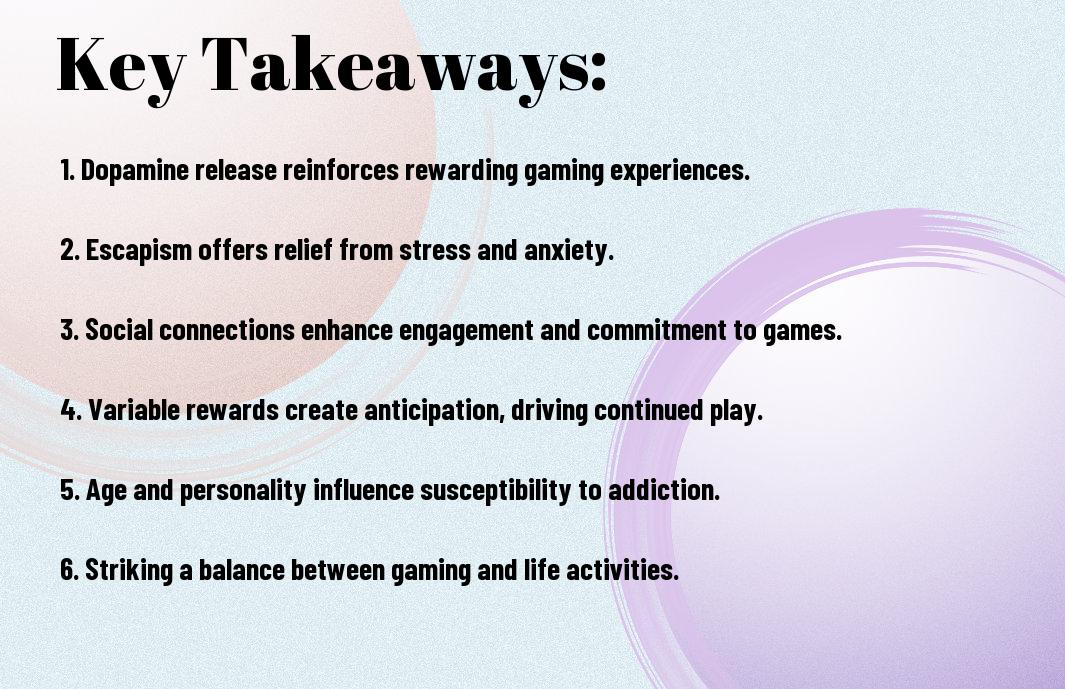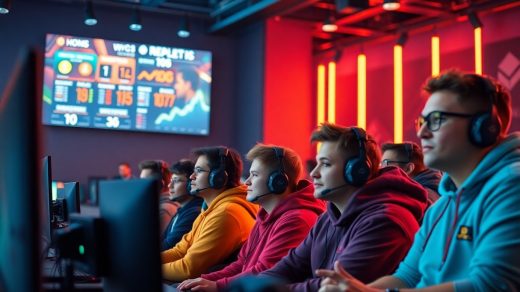As you explore into the world of gaming, you may find yourself wondering what drives your behavior and motivates you to continue playing. You might ask yourself why you feel an overwhelming urge to keep gaming, even when it starts to interfere with your daily life. Your curiosity is valid, and understanding the psychological factors at play can help you make sense of your actions and develop a healthier relationship with gaming.

Key Takeaways:
- The brain’s reward system plays a significant role in gaming addiction, as games activate the release of dopamine, a neurotransmitter associated with pleasure and motivation, leading to a cycle of craving and consumption.
- Gaming addiction can be classified as a behavioral addiction, sharing similarities with substance use disorders, and can have negative effects on mental and physical health, relationships, and daily life.
- Personal characteristics, such as personality traits, coping mechanisms, and life experiences, can contribute to an individual’s susceptibility to gaming addiction, making some people more prone to addictive behaviors.
- Social interactions and online communities can both positively and negatively impact gaming habits, as social support and camaraderie can enhance the gaming experience, but also facilitate excessive gaming and social isolation.
- Cognitive factors, including attention, perception, and decision-making, are affected by gaming, and can lead to a state of “flow,” where gamers become fully engaged and immersed in the game, losing track of time and neglecting other responsibilities.
- Neuroplasticity, the brain’s ability to reorganize and adapt, is influenced by gaming, and can lead to long-term changes in brain structure and function, particularly in regions related to reward, motivation, and impulse control.
- Treatment and prevention strategies for gaming addiction should focus on a multidisciplinary approach, incorporating psychological, social, and environmental factors, and addressing underlying issues, such as stress, anxiety, and low self-esteem, to promote healthy gaming habits and overall well-being.
Brain Chemistry and Gaming
For a deeper understanding of gaming addiction, it’s imperative to explore the brain chemistry involved. You’ll discover that gaming affects your brain’s reward system, releasing feel-good chemicals that can lead to addiction.
Dopamine Release Patterns
Any time you engage in a rewarding activity, such as gaming, your brain releases dopamine, a neurotransmitter associated with pleasure and motivation. You experience a surge of excitement and satisfaction, encouraging you to continue playing.
Neural Reward Systems
Above all, neural reward systems play a significant role in gaming addiction. You see, your brain is wired to respond to rewards, and gaming provides a constant stream of rewards, activating your brain’s reward system and releasing dopamine.
Gaming activates the same neural pathways as other addictive behaviors, releasing dopamine and creating a feeling of pleasure and satisfaction. As you continue to game, your brain adapts, requiring more stimulation to achieve the same feeling, leading to a cycle of addiction that can be challenging to break. You may find yourself spending more time gaming, neglecting other aspects of your life, and experiencing withdrawal symptoms when you try to stop.

Behavioral Patterns
Any gamer can develop habits that lead to addiction, as you explore the psychology behind gaming addiction. You can learn more about this topic by visiting The Psychology of Video Games: Current Research on Video Games and Learning to understand the underlying factors.
Compulsive Gaming Cycles
Along with the thrill of gaming, you may experience compulsive cycles that drive your behavior, leading to extended gaming sessions and neglect of daily responsibilities.
Time Displacement Effects
Gaming can lead to time displacement effects, where you spend more time playing games than engaging in other activities, affecting your daily routine and social interactions.
Even as you enjoy gaming, you should be aware of the potential time displacement effects, which can impact your work, relationships, and overall well-being, making it vital to maintain a balance between gaming and other aspects of your life.
Risk Factors
All individuals can be susceptible to gaming addiction, but certain factors increase your risk. Consider the following:
- Family history
- Mental health
- Social environment
After understanding these factors, you can better assess your vulnerability.
Psychological Predispositions
Besides your personality, psychological traits like stress and anxiety can contribute to your susceptibility. You may find that your emotional state plays a significant role in your gaming habits.
Environmental Triggers
By surrounding yourself with gaming opportunities, you increase your chances of developing an addiction. You should be aware of the potential risks in your environment.
It is imperative to recognize that environmental triggers, such as social pressures and accessibility of games, can significantly influence your behavior. You need to consider how your surroundings affect your gaming habits and take steps to mitigate potential risks, ensuring you maintain a healthy balance in your life.
Social Impact
Unlike other addictions, gaming addiction can have a significant impact on your social life, affecting your relationships and daily interactions with others.
Relationship Deterioration
Prior to the onset of gaming addiction, you may have had strong, healthy relationships, but as your addiction progresses, you may find yourself withdrawing from social interactions and neglecting your loved ones.
Academic/Professional Decline
Beneath the surface of your gaming addiction, your academic or professional performance may be suffering, as you spend more time gaming and less time focusing on your responsibilities and goals.
Further, as your addiction takes hold, you may find that your decline in academic or professional performance has serious consequences, such as poor grades, job loss, or missed opportunities, ultimately affecting your overall well-being and future prospects, making it crucial for you to seek help and address your gaming addiction.
Digital Environment
Once again, you find yourself immersed in the digital world, where the boundaries between reality and fantasy blur. To understand this phenomenon, you can explore the psychology of video game addiction, which sheds light on the underlying factors contributing to your gaming habits.
Game Design Elements
Apparently, the design of games influences your behavior, with elements such as rewards, challenges, and social interactions shaping your experience and encouraging you to continue playing.
Psychological Manipulation
Digitally, you are exposed to various techniques that can manipulate your behavior, including personalized notifications, emotive soundtracks, and persuasive storytelling, all of which can impact your emotional state and decision-making.
For instance, you may notice that certain games use psychological manipulation to keep you engaged, such as variable rewards, social pressure, or emotional investment, which can activate your brain’s reward system and motivate you to continue playing, often at the expense of other aspects of your life, and it’s imperative to be aware of these tactics to maintain control over your gaming habits and overall well-being.
Treatment Approaches
Many treatment approaches are available to help you overcome gaming addiction, and it’s crucial to find the one that suits your needs. You can explore various options, including therapy, support groups, and self-help strategies, to manage your addiction effectively.
Cognitive Behavioral Interventions
Alongside other treatments, cognitive behavioral interventions can help you identify and change negative thought patterns and behaviors associated with gaming addiction, allowing you to develop healthier habits and improve your overall well-being.
Digital Detox Methods
Detaching from digital devices and gaming platforms can be an effective way for you to break the cycle of addiction, and digital detox methods can provide you with a much-needed break from the constant stream of gaming-related stimuli.
Also, as you consider digital detox methods, you may want to explore options such as device-free zones, app blockers, or scheduled downtime, which can help you establish a healthier balance between your gaming habits and other aspects of your life, allowing you to regain control over your behavior and make positive changes.
To wrap up
The psychology behind gaming addiction is a complex issue that affects your life in various ways. As you investigate into the world of gaming, you become aware of the factors that contribute to your addiction. You understand that your brain chemistry, social interactions, and emotional state all play a role in your gaming habits. By recognizing these factors, you can take control of your gaming experience and make informed decisions about your behavior, ultimately improving your overall well-being.
FAQ
Q: What are the underlying psychological factors that contribute to gaming addiction?
A: From a scientific perspective, gaming addiction can be attributed to a combination of psychological factors, including dopamine release, social interaction, and escapism. Dopamine, a neurotransmitter associated with pleasure and reward, is released in abundance during gaming, particularly when players experience accomplishments or achievements. This can create a cycle of craving and consumption, as individuals seek to recreate the feeling of pleasure. Additionally, online gaming communities provide a sense of belonging and social connection, which can be particularly appealing to individuals who struggle with social interactions in real life. Lastly, gaming can serve as an escape from stress, anxiety, or other negative emotions, leading to a pattern of avoidance and reliance on gaming as a coping mechanism.
Q: How does the brain’s reward system contribute to gaming addiction?
A: The brain’s reward system, which is mediated by the release of dopamine, plays a significant role in gaming addiction. When gamers experience rewards, such as leveling up, completing challenges, or receiving loot, their brain releases dopamine, reinforcing the behavior and motivating them to continue playing. This can lead to a phenomenon known as operant conditioning, where the behavior is repeated in anticipation of the reward. Furthermore, the variable ratio schedule of rewards in many games, where rewards are provided at unpredictable intervals, can activate the brain’s reward system, releasing dopamine and encouraging continued play. This can result in a state of hypofrontality, where the prefrontal cortex, responsible for decision-making and impulse control, is diminished, leading to impulsive and compulsive behavior.
Q: Can gaming addiction be treated, and what are the most effective interventions?
A: Yes, gaming addiction can be treated, and a comprehensive approach that incorporates multiple interventions is often the most effective. Cognitive-behavioral therapy (CBT) has been shown to be particularly effective in addressing gaming addiction, as it helps individuals identify and challenge negative thought patterns and behaviors associated with gaming. Additionally, family therapy can be beneficial in addressing underlying relationship issues and developing strategies for supporting the individual in their recovery. Other interventions, such as mindfulness-based therapies, self-help groups, and medication, may also be useful in addressing underlying mental health issues, such as anxiety or depression, that may be contributing to the gaming addiction. A multidisciplinary approach, incorporating the support of mental health professionals, family, and friends, is often necessary to achieve lasting recovery from gaming addiction.


